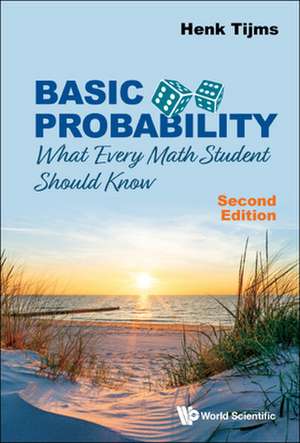BASIC PROBABILITY (2ND ED)
Autor Henk Tijmsen Limba Engleză Paperback – 29 iun 2021
While retaining its focus on basic probability, including Bayesian probability and the interface between probability and computer simulation, this edition's significant revisions are as follows:
- Many extra motivational examples and problems
- New material on Bayesian probability, including two famous court cases
- New sections on real-world applications of the Poisson distribution
- New sections on generating functions and the bivariate normal density
- New chapter on Markov chains, including Markov chain Monte Carlo simulation
The approach followed in the book is to develop probabilistic intuition before diving into details. The best way to learn probability is by practising on a lot of problems. Many instructive problems together with problem-solving strategies are given. Answers to all problems and worked-out solutions to selected problems are also provided.
Henk Tijms is the author of several textbooks in the area of applied probability. In 2008, he had received the prestigious INFORMS Expository Writing Award for his work. He is active in popularizing probability at Dutch high schools.
| Toate formatele și edițiile | Preț | Express |
|---|---|---|
| Paperback (1) | 229.41 lei 3-5 săpt. | +12.13 lei 10-14 zile |
| World Scientific – 29 iun 2021 | 229.41 lei 3-5 săpt. | +12.13 lei 10-14 zile |
| Hardback (1) | 408.51 lei 6-8 săpt. | |
| World Scientific – 29 iun 2021 | 408.51 lei 6-8 săpt. |
Preț: 229.41 lei
Nou
Puncte Express: 344
Preț estimativ în valută:
43.90€ • 45.96$ • 36.32£
43.90€ • 45.96$ • 36.32£
Carte disponibilă
Livrare economică 15-29 martie
Livrare express 04-08 martie pentru 22.12 lei
Preluare comenzi: 021 569.72.76
Specificații
ISBN-13: 9789811238512
ISBN-10: 9811238510
Pagini: 184
Dimensiuni: 152 x 229 x 10 mm
Greutate: 0.28 kg
Editura: World Scientific
ISBN-10: 9811238510
Pagini: 184
Dimensiuni: 152 x 229 x 10 mm
Greutate: 0.28 kg
Editura: World Scientific
Descriere
The second edition represents an ongoing effort to make probability accessible to students in a wide range of fields such as mathematics, statistics and data science, engineering, computer science, and business analytics.
